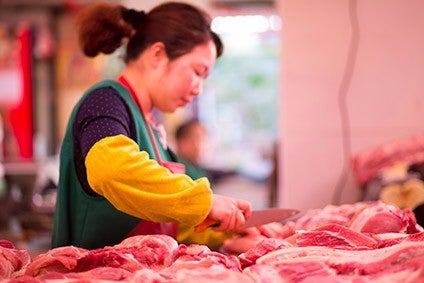
China, one of the Brazilian meat industry major international customers, was among a number of countries to either fully or ease bans on the country’s imports that were introduced in the wake of the corruption allegations that have swirled around the sector.
Beijing has lifted its ban on imports of all meat from the South American country except from one plant that has been named among the 21 under investigation by the Brazilian police.

Discover B2B Marketing That Performs
Combine business intelligence and editorial excellence to reach engaged professionals across 36 leading media platforms.
Brazil has itself banned exports from the 21 sites. According to Reuters, the only one of the 21 facilities that had been shipping to China is owned by a unit of JBS, one of Brazil’s largest meat processors.
“The restoration of Brazilian meat shipments into China shows the spirit of mutual trust between the two countries and the willingness to dialogue in good faith,” Blairo Maggi, Brazil’s Agriculture Minister, said. “China never closed the market to our products, but only took preventive measures so that we had the opportunity to provide all the necessary explanations and to guarantee the quality of our sanitary inspection.”
Over the weekend, Chile and Egypt lifted their bans on Brazilian meat imports. “The measures announced by the governments of Egypt and Chile confirm the confidence of the international community in our world-renowned system of health control,” Maggi said.
However, on Sunday, Switzerland reportedly extended its restrictions on shipments from Brazil from four plants to 21.

US Tariffs are shifting - will you react or anticipate?
Don’t let policy changes catch you off guard. Stay proactive with real-time data and expert analysis.
By GlobalDataMarkets that also included Canada, the EU and Japan last week placed bans or restrictions on meat imports from Brazil in the wake of the allegations, which were announced on Friday 17 March.
Police accuse executives from large meat processing companies of paying politicians and inspectors from Brazil’s Ministry of Agriculture to overlook unsanitary practices, allowing them to manufacture adulterated products. Police claim ministry officials in the states of Paraná, Minas Gerais and Goiás acted to protect the companies.
Brazil’s federal revenue agency allege the corrupt inspections resulted in adulterated products being allowed to be sold for human consumption circulating freely in the domestic market, serve as school snacks or being exported.
The Brazilian government has attempted to emphasise the probe is focusing only specific incidents and it has sought to talk up the quality of the country’s meat industry.
However, on Friday (24 March), Reuters, citing three sources familiar with the police investigation, said the probe contains more than 8,000 pages of evidence suggesting systematic fraud.
Earlier on Friday, BRF, another of the Brazilian meat processors at the centre of the claims, announced it had set up a “quality certification group to re-attest that the company adheres to international food safety standards”. BRF has also formed an internal committee to “closely monitor the current situation of the Company and recommend solutions to the current challenges BRF faces”.
It said: “BRF does not concur with illicit conduct and categorically refutes any insinuation to the contrary. If anything unlawful is discovered as part of this ongoing investigation, BRF will take all necessary and appropriate action to address the situation.”
On 17 March, the day the Carne Fraca, or “Weak Flesh” investigation and allegations were announced, JBS issued a statement to say police had conducted raids at several Brazilian companies, which involved three of its own facilities – two in Paraná and one in Goiás.
The company said no judicial measures have been taken against the company’s executives and underlined its headquarters were not a target of the operation.
However, JBS admitted “a judicial measure” was issued at one of its facilities in Paraná against one of its veterinarians, who performs auxiliary inspections services for the Ministry of Agriculture.
“The company strongly repudiates any practices related to product adulteration or tampering, whether in the production or sale of products, and it is available to address any concerns with the authorities,” JBS said.
On Thursday last week, JBS announced it had suspended output at 33 of its 36 domestic plants in the wake of the allegations. JBS said this week it would run all its domestic factories “with a reduction of 35% of its productive capacity”.





